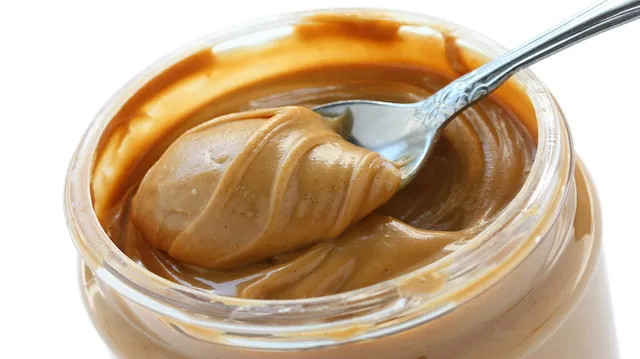A new peanut butter available for purchase in a handful of stores located in Massachusetts and Connecticut contains more caffeine than Red Bull. STEEM, a peanut butter advertised as a product that gives you “hours of endurance and focus,” contains 150 milligrams of caffeine per serving, which is two tablespoons, according to the company’s website.
The caffeine in STEEM peanut butter is almost double the amount a Red Bull delivers, at 80 milligrams per can or energy shot, and nearly three times the amount found in caffeinated tea. Even a 16-fluid-ounce Starbucks Latte contains roughly 20 milligrams less caffeine than the new peanut butter product per serving.
On the product’s label, protein, electrolytes and caffeine are listed right below the graphic of a jet-pack-donned rocket man. STEEM’s marketing is clearly aimed at young, outdoor, adventurous individuals. However, not everyone is enthused. Senator Charles Schumer has spoken out against the dangers of STEEM and has called on the U.S. Food and Drug Administration (FDA) to regulate the product.
“This may look like an ordinary jar of peanut butter, and it may cost the same as a jar of peanut butter, but the fact is, it’s much more dangerous than an ordinary jar of peanut butter,” Schumer said in a press conference. Currently, the FDA does not require manufacturers to list caffeine on their food labels, which leads to Americans consuming way more caffeine than they know.

Adding high levels of caffeine to a product that most children and adolescents commonly consume can’t be good. The marketing of energy drinks, like Red Bull, has led a young generation down a path to possible health problems as they reach middle age. A study published in Pediatrics (2011) found that of the 5,448 caffeine overdoses in the U.S. reported in 2007, 46 percent occurred in kids under the age of 19. The study examined only energy drinks, and STEEM peanut butter contains more caffeine than both Red Bull and Monster energy drinks.
Interestingly, STEEM strongly advises against feeding the peanut butter to pets. The company’s website states, “DO NOT GIVE TO ANIMALS. EVER. Fun fact: a lot of domestic animals, like dogs and cats and birds, cannot digest caffeine properly and it can lead to SERIOUS health issues.” Nowhere on the site does the company take into account the ill effects of caffeine on children!
So how much caffeine can the average adult consume? A report published by the FDA defines moderate caffeine consumption as 100 to 200 milligrams of caffeine per day. It is great to be aware of a recommended daily amount, but in reality consumers often have little knowledge of how much caffeine they consume in milligrams since product labels can be misleading.
Do you know how much caffeine you are consuming daily?
—Stephen Seifert
Stephen Seifert is a writer, professor, adventurer and a health & fitness guru. His flair for travel and outdoor adventure allows him to enjoy culture and traditions different than his own. A healthy diet, routine fitness and constant mental development is the cornerstone to Stephen’s life.
Sources:
http://steempb.com
http://steempb.com/assets/img/nutrition.png
http://www.ncbi.nlm.nih.gov/pmc/articles/PMC3065144
http://www.fda.gov/downloads/UCM200805.pdf
